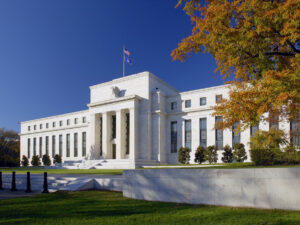More than 100 lawmakers urge Fed, regulators to revise Basel III tax equity provisions


(Courtesy: Federal Reserve)
Led by U.S. Congressman Sean Casten (IL-06), 106 lawmakers sent a letter to Federal Reserve Chairman Jerome Powell, Federal Deposit Insurance Commission Chairman Martin Gruenberg, and Acting Comptroller of the Currency Michael Hsu, urging the agencies to revise tax equity provisions in the proposed Basel III rules that they say could imperil the clean energy transition.
On July 27, 2023, the Office of the Comptroller of the Currency, Treasury; the Board of Governors of the Federal Reserve System; and the Federal Deposit Insurance Corporation jointly released a Notice of Proposed Rulemaking (NPR) for the finalization of Basel III rules. The proposed rules, which would take effect in 2025, substantially revise the capital requirements applicable to large banking organizations (and their depository subsidiaries) and banking organizations with significant trading activity.
Among other things, the proposed rules change the risk weighting of the types of investments that include clean energy tax equity investments. The expanded simple risk-weight approach (ESRWA) in the proposed rules could have serious consequences for future traditional tax equity financings because ESRWA would quadruple the capital requirement for banks holding tax equity investments, rendering traditional tax equity prohibitively costly for banks subject to ESRWA.
“As written, the proposed rule would make it prohibitively expensive for banks to extend tax equity financing for clean energy project development, which would slow deployment of clean energy generation and manufacturing,” the letter said. “Leading tax equity providers anticipate that annual tax equity investments in the clean energy sector could shrink by up to 90%, and many banks could exit the renewable tax equity market entirely. More urgently, we are aware of this draft rule already causing tax equity providers to pause new clean energy investments pending the outcome of the regulatory rulemaking.”
Earlier this year, Hilary Lefko, a partner at the law firm Norton Rose Fulbright, appeared on the Factor This! podcast to discuss the potential consequences of the proposed rule, which she called “dire.”
Episode 62 of the Factor This! podcast features Hilary Lefko, a partner at the law firm Norton Rose Fulbright, who warns a proposed ruling from banking authorities could lead to “dire consequences” for the tax equity market and clean energy goals. Subscribe wherever you get your podcasts.
The Basel Committee for Banking Supervision (“BCBS”) is a committee of banking authorities and central banks, with 45 members from 28 jurisdictions. BCBS is the primary global standard setter for the regulation of banks. It has a mandate to strengthen the regulation, supervision, and practices of banks worldwide to enhance financial stability. BCBS furthers that mandate by releasing standards for internationally active banks known as the “Basel Framework.”
The most recent addition to the Basel Framework is “Basel III,” which was released in response to the 2007-2009 global financial crisis. The final round of Basel III capital framework reforms, which was published by the BCBS in 2017, is referred to as the “Basel III Endgame” due to the breadth of its reforms. The implementation of the Basel III Endgame was deferred until January 2023, and the U.S. had not proposed implementing rules until July 2023 when the U.S. Banking Authorities issued the NPR.
The Basel III Endgame reforms apply to banks with $100 billion or more in total assets, which are known as “large banks.” A portion of the reforms related to market risk also apply to smaller banks with significant trading activities (i.e., $5 billion or more in trading assets plus trading liabilities or trading assets plus trading liabilities equal to or more than 10% of total assets).
The rule in question, the ESRWA, expands risk weights applicable to equity exposures. Banks are required to maintain certain amounts of capital based on the risk associated with their investments. Holding capital is costly for banks. Investments deemed riskier under the proposed rules carry higher capital requirements.
“Tax equity is a predominant source of financing in the U.S. renewable energy market, and it is critical that federal agencies immediately clarify a risk weight for renewable energy tax equity reflective of these investments’ loan-like characteristics, low-risk profile, and overwhelmingly positive historical returns,” said Lesley Hunter, Senior Vice President of Programs and Sustainable Finance for the American Council on Renewable Energy (ACORE). “Near-term action is essential to avoid stifling crucial financing for the renewable sector at a time when it is needed most.”




